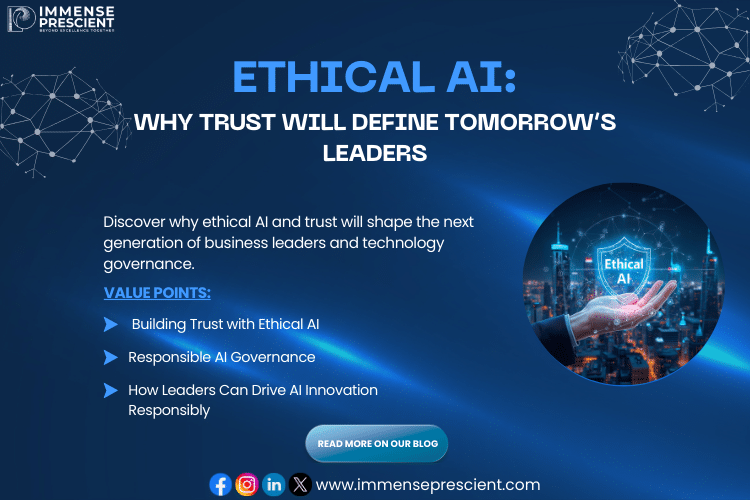Ethical AI: Why Trust Will Define Tomorrow’s Leaders
Introduction – Ethical AI: Why Trust Will Define Tomorrow’s Leaders
In the race to adopt artificial intelligence (AI), one factor will determine who leads and who lags: trust. Organizations embracing ethical AI and prioritising responsible AI governance are not only future-proofing their businesses but also gaining a competitive edge. Tomorrow’s leaders will be defined by how they balance innovation with responsibility.
For more on how AI is transforming business, read our blog The Future of AI in Business: From Automation to Innovation.
1. Building Trust with Ethical AI
Trust is no longer a soft metric; it’s a hard business differentiator. AI systems influence decisions in hiring, lending, healthcare, and public safety. Leaders must ensure these systems are transparent, fair, and explainable.
Key steps for building trust:
- Transparency: Make algorithms and data sources clear to stakeholders (see OECD AI Principles).
- Bias Mitigation: Regularly audit AI systems for unintended biases.
- User Privacy: Prioritize data protection and informed consent (refer to GDPR regulations).
By embedding ethical principles in AI, organizations can create experiences that customers and employees genuinely trust.
Learn more about making data work for you in our guide Turning Big Data into Business Value: A Practical Guide.
2. Responsible AI Governance
Governance frameworks help align AI projects with legal, ethical, and societal standards. Responsible AI governance includes:
- Establishing an AI ethics committee.
- Creating clear policies for data use, model monitoring, and escalation of risks.
- Training leadership and teams on compliance and ethics.
When governance is proactive rather than reactive, it prevents reputational damage and regulatory penalties.
For a deeper dive, see the EU AI Act overview, which highlights how governments worldwide are setting rules for responsible AI.
Also check our article How to Align Technology Investments with Business Outcomes for tips on aligning AI strategy with overall business goals.
3. How Leaders Can Drive AI Innovation Responsibly
Leaders play a critical role in shaping the AI future:
- Set the Tone from the Top: Clearly articulate ethical priorities.
- Invest in Education: Equip teams with the skills to design responsible AI.
- Collaborate with Stakeholders: Engage regulators, partners, and communities in the AI journey.
- Measure Outcomes: Track not only business ROI but also societal and ethical impacts.
When leaders align AI innovation with ethical principles, they unlock new levels of trust, loyalty, and market leadership.
See our blog Why Every CEO Needs to Think Like a Technologist to learn more about leadership and technology convergence.
For additional insights, MIT Sloan Management Review on Building Trust in AI offers practical examples from global enterprises.
Conclusion
As AI becomes more integrated into daily operations, tomorrow’s most successful leaders will be those who embrace ethical AI as a strategic imperative. Building trust, ensuring responsible governance, and leading innovation with integrity will define not only the future of technology but the future of leadership itself.
For more on how agile leadership drives innovation, read Engineering for Agility: How Our Teams Build Solutions That Evolve With You.




